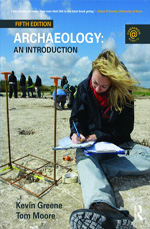
Archaeology is the study of past human societies through their material remains. As such, it can be seen as one branch of anthropology. Indeed, in North America archaeology is taught as one of the four subfields of anthropological study. Many of the ‘big questions’ studied by archaeologists are of general anthropological interest. The issues of joint concern include: the study of early hominids and of the origins of Homo sapiens; the transition between gatherer-hunter ways of life and of settled agriculture; social evolution and the ‘rise of social complexity’, in particular the origins and development of early state societies.
Archaeologists employ a range of techniques to find out about past human groups. In addition to excavation, these include surveying landscapes, examining buildings and analysing artefacts. They frequently use parallels with contemporary societies in their interpretations, for example when asking questions about trade networks, agricultural systems or religious belief.
Traditionally, archaeology has been concerned with the distant past. In recent years, however, the archaeology of more recent historical periods and the study of material cultures in the present have become increasingly important. Archaeologists have asked what material things can tell us of recent and modern societies. The subdiscipline of ‘ethnoarchaeology’ studies societies and their material culture in the present. Archaeology and cultural anthropology increasingly share a range of common theoretical concerns including gender, symbolism, the role of narrative and questions of history and cultural identity.
Text written by Dr. Matthew H. Johnson
Postgraduate Degree Programmes in the UK
![]() University of Liverpool
University of Liverpool![]() University of Manchester
University of Manchester
![]() Newcastle University
Newcastle University![]() University of Nottingham
University of Nottingham
University of Wales Trinity St. David
Recommended Resources
General
http://www.bbc.co.uk/history/archaeology/ - BBC’s archaeology in-depth website is a great site for those beginning to learn about the subject.
http://www.archaeologychannel.org/ - The Archaeology Chanel provides various teaching and learning and audio/visual resources.
http://www.archaeologica.org/index.html - A website with archaeology resources and daily updated news feed.
https://www.archnet.org/ - a virtual library of Archaeology.
Books



Archaeology – An Introduction 5th Edition
Greene, K. and Moore, T. (Routledge, 2010)
Archaeology: Theory, Methods and Practice
Renfrew, C. and Bahn, P. (Thames and Hudson, 2008)
Archaeology in Practice: A Student Guide to Archaeological Analyses
J. Balme and A. Paterson (Eds) (Wiley Blackwell, 2005)
Professional Organisations and Associations
British Archaeological Association - The BAA was founded in 1843, and aims to promote the study of archaeology, art and architecture and the preservation of national antiquities.
Council for British Archaeology - The CBA is an educational charity working throughout the UK to involve people in archaeology and to promote the appreciation and care of the historic environment for the benefit of present and future generations.
English Heritage- English Heritage is the Government's statutory adviser on the historic environment. The organisation exists to protect and promote England's spectacular historic environment and ensure that its past is researched and understood.
Insitute for Archaeologists - The IFA is a professional organisation for all archaeologists and others involved in protecting and understanding the historic environment.
World Archaeological Congress - The WAC is a non-governmental, not-for-profit organization and is the only representative world-wide body of practising archaeologists.


 University of Leicester
University of Leicester Oxford University
Oxford University 